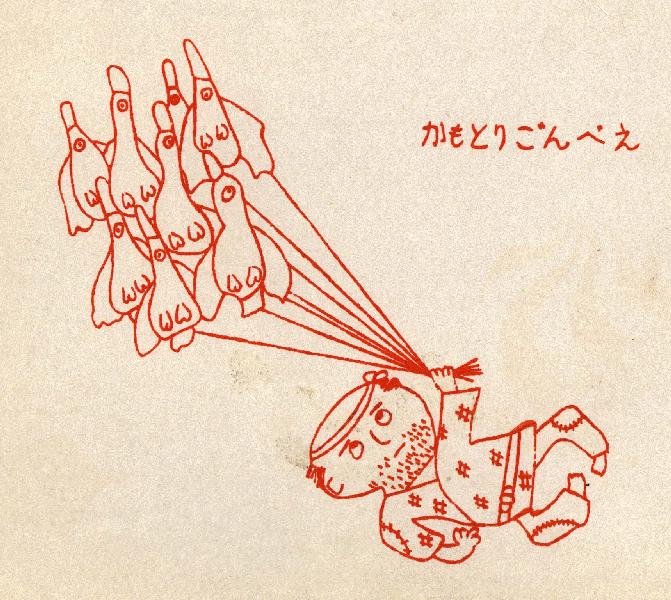Gombei the Duck Hunter

Long ago in a hut at the edge of a large marsh there lived a
duck hunter named Gombei. Does the term "duck hunter" make you
think of a tall, stern man who rises before dawn and sets out
with a shotgun over his shoulder? If so, I have used the wrong
term.
While still young, Gombei had learned the trick of making a
snare with a bit of string. All his life, he made a living with
that one trick.
Each afternoon he would take a bit of string and set one
snare at the edge of the marsh. Each morning he would rise well
before noon, remove one duck from the snare, and start the long
walk into the village. There he would sell the duck and buy a
little rice and a few vegetables for that night's meal. Some
days someone in the village would hire him to clear a field or
haul some wood. Then he would have the money to make a small but
loud offering at the village shrine and to drink a little sake
before trudging back to his hut.
It often occurred to Gombei that his life was hard. One day
it occurred to him that he could make it easier. Suppose he were
to set two snares and catch two ducks? Or suppose he set three
snares and caught three ducks? He might even set five snares and
catch five ducks. Then for the next five days-- no, four days--
he would not have to leave his hut at all. Imagine such a
thing-- a vacation!
Gombei thought awhile about the bright new life before him.
Then he gathered up every bit of string in the hut and set out
for the marsh, where he set fifty snares for fifty ducks.
The next morning Gombei woke up well before noon to the not
too distant sound of quacking ducks. He left the hut with a
light heart.
Ducks in snares were scattered all up and down the edge of
the marsh. Were there fifty? I don't know. Gombei didn't count
them, but began collecting them. He brought each duck, still in
its snare, to an exposed root on dry ground.
Finally all the ducks were tied up in one spot. Gombei
wrapped the bits of string securely around one hand. He used the
other hand to cut the loops from the root.
The ducks, still quacking loudly, flapped their wings and
rose slowly in the air. Gombei rose with them. He had not
expected this to happen, and he had not planned what to do. And
so he did nothing except, of course, to rise slowly in the air.
Eventually Gombei opened his eyes. A little later he looked
down. The ducks were flying away from the marsh, and seemed to
be headed toward the village. Yes, he could see the high iron
roof of the village shrine not too far ahead. Gombei bowed as
well as he could, clapped his hands and began to pray
desperately.
You may ask how Gombei could clap his hands while holding on
to fifty bits of string. Of course he could not. The ducks
zoomed up in many different directions while Gombei shot straight
down. In a moment he landed on the high iron roof with a loud
clang.
All the villagers ran to the shrine to see what had made the
noise. They saw a being of some kind, not a bird, huddled high
up on the roof. (Gombei may have been very stiff and sore, or he
may have been very frightened. In any case, he did not move.)
Was it the deity? Was it a thief? Some children said it had
flown down from the sky. Some villagers bowed, and some squinted
and stared. One called up to the being and asked what it
desired.
Now Gombei knew he was still alive, and yelled back down to
the crowd. A little rice, perhaps, and some pickles would be
fine. And his throat was dry.
Gombei heard the villagers shout, "It's Gombei!" Then he
heard a clang, as a stick hit the iron roof near his foot. It
was followed by a rock.
Now less stiff and sore, Gombei slid off the roof, jumped to
his feet, and ran till he reached his hut at the edge of the
marsh. The next morning he awoke hungry, well before noon. He
went out and set one snare to catch one duck.
Back to Translations Table of Contents
Back to Quilt Stories
